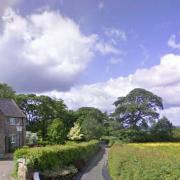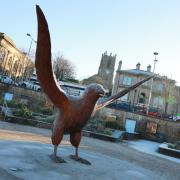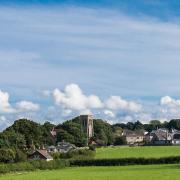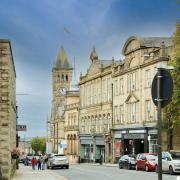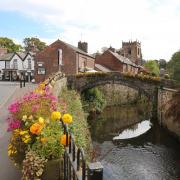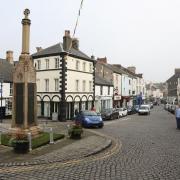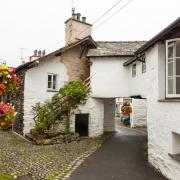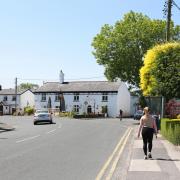These vintage engines aren’t museum pieces, they’re powering the transformation of a farm in Bouth, writes Sine Fleet. Photography by Glynn Ward

The magnificent south Lakeland hills are home to a unique historic working farm, which gives visitors a rare glimpse into rural Victorian life. Using traditional methods to grow crops and harvest the land, owners Alex and Charlotte Sharphouse work their 100 acres with heavy horses and vintage machinery, including steam-powered engines and vintage tractors.
The tenacious pair bought the farm at Bouth near Ulverston in 2007 and have brought the once derelict buildings back to life, working tirelessly in the process, juggling full-time careers to make their dream a reality. The couple combined their skills and interests to make the farm a success – Charlotte has the business expertise, having been operations director for Cartmel Sticky Toffee Pudding Company for more than a decade, and Alex is a self-employed steam engineer, working for Lakeside and Haverthwaite Railway among others, and was previously an agricultural contractor.
‘Alex’s passion is steam and steam engines,’ says Charlotte. ‘He had a huge collection of historic farm machinery and steam engines and my passion was always horses, so we decided to create a business combining those skills with my business experience,’ says Charlotte.
‘When the farmhouse was renovated we moved in and began doing open days on some weekends to showcase our work – steam ploughing and steam threshing – showing people the vintage tractors and the working shire horses,’ explains Charlotte. ‘We had to go out and buy all our farm stock because we wanted this to be a traditional Lakeland farm which would have had beef, Jersey cows, arable farming, and pigs. It’s been a massive learning curve.

‘We knew a little about traditional farming methods – like ‘stooking’ the corn with a tractor – but we certainly didn’t know it all, so we went and found local people who had done this type of work years ago and they were very happy to come and pass on their skills.’
Initially they were both working full time and operating the farm with help of friends and family, but Alex and Charlotte realised they needed to turn it into a full-time endeavour to make it work. Now, the farm is open every day throughout the spring and summer, and visitors can see traditional 19th century farming life unfold first-hand. This is a real working farm, with a working schedule – so what you’ll see will depend on the time of year, and on the weather. ‘You can only make hay while the sun shines,’ laughs Charlotte.
You may see steam ploughing and vintage machinery and equipment in action, or shire horse ploughing. A visit to the working dairy with its own ice cream parlour is a must, and there’s also a farm shop and the Chicken Shed Tea Room. To keep young visitors happy in all weathers there’s a large children’s play barn and pedal tractors, but the menagerie of farm animals are the main attraction for little ones. Scattered around the farm are historic outbuildings which house Hereford cattle and the Jersey dairy herd that produce cream for the farm’s dairy products. Elsewhere there are handsome shire and Clydesdale horses, donkeys and miniature Shetland ponies, Gloucester Old Spot and saddleback pigs in traditional pens as well as a whole host of hens and ducks.
Another collection of buildings house Alex’s lifelong passion – a huge variety of vintage and steam powered vehicles and machines, some fully restored, some works in progress as part of his restoration business. There are steam ploughing engines, ploughs, water-carts, live-in vans, threshing machines and horse-drawn implements that are not merely on display, they are used wherever possible. Alex and Charlotte were determined to put these machines back work, rather than them just being exhibits.
Amazingly, Alex’s expertise is completely self-taught. ‘As a young kid I would use whatever I could get my hands on and take it to bits, like lawn mowers, old motorbikes, stationary engines,’ he said. ‘I started doing them up and taking them to shows. I bought a steam roller when I was about 18 and fully restored it.
‘I’ve always been a steam engine enthusiast, so a couple of years ago I thought “why not try to build one from scratch?” I discovered I could buy the John Fowler & Co name (a leading historic manufacturer of steam engines during the 1800s and 1900s) and obtained original design drawings,’ he explains. Subsequently in 2104, Alex and his team of steam enthusiasts embarked on a project to recreate one of the classic steam engines of the 20th century as new – the Talisman, a Fowler road locomotive. The original Talisman engines carried heavy haulage in excess of 100 tonnes across the world, including parts of the Titanic and huge Lancashire boilers.
Also working on this ambitious project are Steve Faulkner and Jack Dibnah, son of the famous steeplejack Fred. The team hope the impressive historic locomotive will be completed over the next couple of years, depending on funding, and are hoping to showcase the steam engine’s capabilities around the country by pulling a heavy load from Land’s End to John O’Groats.
Old Hall Farm is open seven days a week until late October. Find out more at oldhallfarmbouth.com




